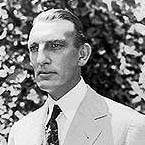Charles Brabin (Charles Brabin)

Motion Picture Director. Forgotten today, he was highly esteemed in the years following World War I. His independent production “Driven” (1923, now lost) was hailed as a masterpiece by contemporary critics. On the strength of this picture he was chosen to direct the epic “Ben-Hur” and began shooting in Italy in 1923, but after costly production delays and a filming mishap that allegedly killed several Italian extras, he was replaced by director Fred Niblo. He subsequently sued MGM for breach of contract. As part of a settlement he was rehired by the studio in 1929 and directed several fine films, including the atmospheric thrillers “The Beast of the City” (1932) and “The Mask of Fu Manchu” (1932). Unfortunately, his unlucky work history repeated itself. On the set of “Rasputin and the Empress” (1933) Brabin clashed with John, Ethel and Lionel Barrymore (in their only film together), and was once again fired for inefficiency. He retired soon afterwards. His other credits include “The Lights of New York” (1922), “So Big” (1925), “Stella Maris” (1925), “The Valley of the Giants” (1927), “The Bridge of San Luis Rey” (1929), “Call of the Flesh” (1930), “Day of Reckoning” (1933), and “A Wicked Woman” (1934). Brabin was born in Liverpool, England, and came to the United States as a young man. In 1908 he joined the Edison studio as an actor and made his directing debut in 1911. He was married to screen vamp Theda Bara, whom he had directed in “Kathleen Mavourneen” (1919) and “La Belle Russe” (1919), from 1921 until her death in 1955. (bio by: Bobb Edwards) Family links: Spouse: Theda Bara (1885 – 1955)* *Calculated relationship
Born
- April, 17, 1882
- England
Died
- November, 11, 1957
- USA
Cemetery
- Forest Lawn Memorial Park (Glendale)
- California
- USA

